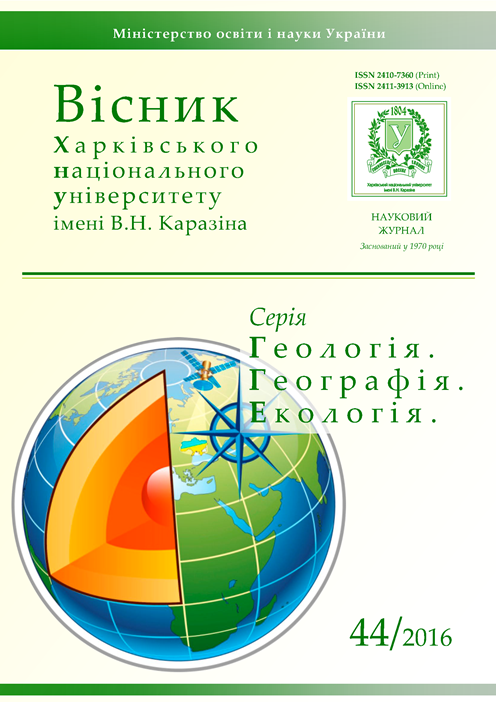Metrization of the inhabited landscapes of Volyn region
Abstract
The article presents the results of Volyn region’s inhabited landscapes metrization. As a result of Volyn available land structure analysis, the anthropogenic landscape class was singled out – built-up area that is an inhabited landscape itself, characterized as one of the most dynamically growing.
The research work was carried out at the administrative microlevel with singling out key areas. The keys for Volyn region were chosen within the bounds of the local councils.
Processing of fund data (including Zem-6 certificate, topographical maps of different time segments) by means of GIS-tecnologies combined with modern IT-programmes let us analyse the correlation of area and structure of inhabited built-up landscapes usage with matrix approach. As a result of matrix analysis both territorial and structural differences in correlation of inhabited built-up share in Volyn region were found out.
Quantitative assessment and dynamics analysis of inhabited landscape pattern which is characterized by distinguished boundaries were carried out by means of metric approach. Landscape contour division coefficient, circular index was defined.
The territory of Volyn region upland area is determined to have higher contour division coefficient in comparison to Polissya territory, which is explained by a variegated landscape pattern with well-planned and divided into streets and blocks development. A number of map charts, diagrams, matrixes were constructed according to the results of the research work
Downloads
References
2. Vyktorov, A.S. (1989). Rysnok landshafta [Pattern of the landscape]. Moskva: Myisl 179.
3. Department Derzhheokadastru in Volyn region. Available at : http://zem.voladm.gov.ua/index.php
4. Denysyk, G. I. 1998. Antropogenni landshafty Pravoberezhnoi' Ukrai'ny. [Anthropogenic landscapes of Right-bank Ukraine]. Vinnycja. Ukrain: Arbat, 289.
5. Kiptach, F., Kukurudza, S. (2002). Metryzatsiya ekolohichnoho stanu zemel'nykh resursiv lisostepovykh landshaftiv. [Metryzatsiya ecological state of land resources steppe landscapes]. L'viv. Ukrain, 118.
6. Kukurudza, S.I. (2013). Metryzatsiya landshaftnoho riznomanittya: kontseptual'no-metodolohichni osnovy. [Metrization of landscape variety : conceptually-methodological bases ]. L'viv. Ukrain, 218.
7. Kukurudza, S.I. (2013). Metryzatsiya pryrodnoho seredovyshcha yak aktual'na pryrodnyo-heohrafichna problema. [Metryzation of the natural environment as a current natural-geographical problem]. Ukrainian Geographical Journal, 3, 16-20.
8. Mal'chykova, D.S. (2010). Vykorystannya HIS/DZZ-tekhnolohiy dlya vyvchennya terytorial'noyi struktury zemlekorystuvannya rehionu. [GIS/RS- technologies of the study of land use territorial structure of region]. The problems of continuous education and geographical mapping, 12, 123-128.
9. The National Atlas of Ukraine Natsional'nyy atlas Ukrayiny. Available at : http://igna.org.ua/maps_elektron.html
10. Nychaya, O.O., Tarasyuk, N.A. (2015). Heohrafichna otsinka suchasnoho stanu vykorystannya zabudovanykh zemel' terytoriyi Polissya (na prykladi Volyns'koyi oblasti). [The geographical assessment of the current condition of the built-up land use in the territory of Polissia (Volyn region)]. Scientific notes Ternopil National Pedagogical University named after Vladimir Gnatyuk, 2, 200-208.
11. Nychaya, O.O., Tarasyuk, N.A. (2014) Klimatychna skladova chastyna formuvannya rekreatsiynoho landshaftu ShNPP. [The climatic constituent of the recreational landscape forming of Shatsk’s national natural park]. Nature in Western Polissya and surrounding areas, 11, 95-101.
12. Nychaya, O.O. (2015). Retrospektyvno-heohrafichnyy analiz zabudovy yak vydu pryrodokorystuvannya na terytoriyi Volyns'koyi vysochyny (na prykladi volyns'koyi oblasti). [Retrospective and geographical analysis built-up land as a kind of nature in the Volyn upland (Volyn region)]. Actual problems of modern science. Materials Third International Scientific Conference, II, 20-22.
13. Pavlovs'ka, T.S. (2014). Struktura zemel'nykh uhid' v landshaftno-ekolohichniy orhanizatsiyi terytoriyi Volyns'koyi oblasti. [The structure of the lands in landscape-ecological organization of territory of the Volyn region]. Geopolitics and ekoheodynamyka regions. Nauchniy magazine, 2, 697-704.
14. Rykhter, H. (1983). Kul'tura landshafta v sotsyalystycheskom obshchestve. [Culture landscape in sotsyalystycheskom society]. Moscow, Russia: Progress, 160.
15. Tarasyuk, N.A., Nychaya, O.O. (2015). Doslidzhennya selytebnykh landshaftiv dlya optymizatsiyi rayonnoho planuvannya Volyni ta potreb staloho rozvytku rehionu. [The investigation of the inhabited landscapes for the optimization of the district planning of Volyn’ and for the conditions of the constant development of the region]. Actual problems of geographic science materials II Intern. nauk. and practical. Internet Conference, 42-44.
16. Tarasyuk, N.A., Nychaya, O.O. (2015). Zabudova yak vyd pryrodokorystuvannya v mezhakh Polissya Volyns'koyi oblasti. [The built-up land as a kind of nature of Polissia within the Volyn region]. Modern problems of geography and education in Ukraine: materials V All-Ukrainian scientific conference praktynoyi, 72-73.
17. Tarasyuk N.A., Nychaya O.O. (2015). Rysunok landshaftu yak rezul'tat zminy pryrodnoho seredovyshcha. [Picture landscape as a result of changes in the environment]. Geography, Environment, Tourism, theory methodology, practice. Proceedings of the international scientific conference dedicated to the 25th anniversary of the geographical faculty of Ternopil National University Vladimir Gnatyuk, 131-133.
18. Topchiyev, O.H., Nudel'man, V.I., Rudenko, L.H. (2012). Heohrafiya pered novitnimy vyklykamy i zapytamy (ukrayins'kyy aspekt). [Geography before new calls and queries (Ukrainian aspect)]. Ukrainian Geographical Journal, 2, 3-10.
19. Shvorak, A.V. (2011). Osoblyvosti zemlevporyadkuvannya terytoriyi sil's'koyi (selyshchnoyi) rady. [Features of land management in rural area (village) council]. Land Management Zemlevporyadkuvannya, 4, 25-28.
20. Angelstam, P., Grodzynskyi, M., Andersson, K. (2013). Measurement, Collaborative Learning and Research for Sustainable Use of Ecosystem Services: Landscape Concepts and Europe as Laboratory, 42, 129–145.
21. Grodzynskyi M.D. (2015). Vymiry ta pokaznyky landshaftnoho riznomanittya. [Dimensions and indexes of the landscape diversity]. Journal of Education, Health and Sport, 5(5), 283-291.
22. Google Earth. Available at : www.google.com.ua/intl/ru/earth/
23. Forman, R.T.T., Godron M. (1986). Landscape Ecology. N.Y., 619.
24. McGarigal, K., Cushman, S.A., Ene, E. (2012). Spatial Pattern Analysis Program for Categorical and Continuous Maps. Computer software program produced by the authors at the University of Massachusetts, Amherst.
25. Tarasiuk, N., Nychaia, O. (2014). GIS of regional geography in the study of present landscapes. Materiały konferencyjne GIS DZIŚ. Krakow, 73-75.
26. Tarasiuk, N., Nychaia, O. (2014). The zonal differences of the picture of the modern landscapes of the Eastern Europe (for example in Volyn’ region). KELM. Łódź: Fundacja “Oświata i Nayka Bez Granic PRO FUTURO”. 4 (8), 287-299.





